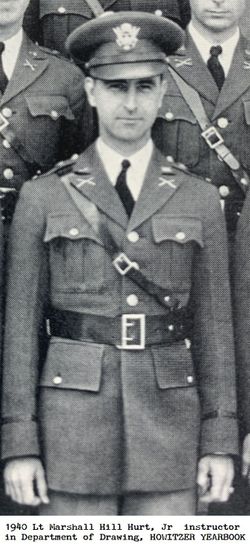Monuments
Prisoner of War Memorial - Fukuoka 2B POW Camp (Nagasaki)
West Point Philippines Defense Memorial

Marshall H. Hurt was born in Tuskegee, Alabama, on June 26th, 1908; the elder son of Marshall Hill Hurt and Josie Lee Williford Hurt. Marshall graduated from the United States Military Academy at West Point in 1930. After entering the United States Army his visits home were infrequent, but interest in Tuskegee and Tuskegee affairs remained with Marshall. After a three-year assignment in Hawaii as aide to General Nuttman, he returned to West Point where he served four years as an instructor in drawing. In 1940 Major Hurt was sent to the Philippines, where he was stationed with the 31st Infantry when war was declared by the United States upon Japan. Marshall loved Army life. Every phase of it was attractive to him, and when the time came that the supreme sacrifice seemed imminent, there was no faltering or looking back.
In the early stages of the active campaign against the Japanese, he served as battalion commander. Just prior to the fall of Bataan he was transferred to General King's headquarters as a member of his staff. When it became necessary to send someone forward to contact the Japanese with the surrender documents, Major Hurt was selected to go, in company with another officer, from a large number of volunteers. This was a highly dangerous mission, but he successfully got in touch with the commander of the Japanese field forces. It is believed that, in accordance with instructions, he was negotiating for the delivery of the American troops to some point designated by the Japanese. These negotiations, however, were brought to a sudden end by the arrival of a staff officer from General Homma's headquarters, the result being what is known as "The Death March of Bataan". He was spared the full horror of this experience, except as he suffered it in spirit with his comrades, as the Japanese provided motor transportation for General King and the officers of his Staff.
Grave fears for his safety had been entertained since the fall of Bataan and Corregidor. At long intervals the sterotyped messages, which were all that the Japanese allowed the prisoners of war, came to bring renewed hope to his parents and family. Always he managed to convey a spirit of optimism. He always he said that he was well, and knowing his fortitude and physical resources they were comforted and strengthened to bear the agonizing suspense.
As a prisoner of war the requirements made upon his fortitude and strength were difficult and arduous. He was confined in four of the most notorious of Japanese prisons—O'Donnell, Bilibid, Cabanatuan and Fukuoka. With no thought of self he went among his fellow sufferers ministering, cheering, comforting, and by his own indomitable spirit infusing fresh courage wherever needed. With one accord his superior officers pronounced the highest praise of his efforts, as adjutant of the prison camp, to alleviate the condition of the prisoners. Quoting from one of the many letters received by his parents, "There is always a group of behind-the-scene workers, who labor without thought of recognition or reward or the fanfare accompanying the moves of the leaders. Marshall was one of that group".
The prison boat upon which Major Hurt was being transferred from Manila to Japan was bombed and sunk by American Navy planes; many perished, but he, with others, swam ashore. A second prison boat was bombed while in harbor, resulting in the death of five hundred American soldiers. Again with several close companions, Major Hurt made a miraculous escape, and arrived in Japan in better physical conditon, seemingly, than the average prisoner. We shall never know all that he endured of humiliation, loneliness and privation, from the fall of Corregidor to his death in Japan, but we do know that he met whatever came to him with the poise and courage that was an integral part of him.
Death came to him suddenly on April the third, nineteen hundred and forty-five in Camp Fukuoka on the Island of Honshu, Japan. The immediate cause was a tropical disease so common among the prisoners that, unless suffering severely, little attention was paid to those affected.
Recent confirmation by the United States Government of the death of Major Marshall Hill Hurt, Jr., wrote "Finis" to the story of a life lived out on the high plane of duty well done, of sulfering heroically endured, and danger faced with unflinching courage. His was not a long life in terms of years, but measured in wealth and variety of human experience it was a full one.
To his parents and his only brother he was the fulfillment of their brightest hopes and ambitions. His friends saw in him the embodiment of those sterling qualities that make for the highest type of American manhood. On his lighter side he was blest with a genial nature, and possessed the rare faculty of attracting others to himself without apparent effort.
Marshall was awarded the Silver Star posthumously March 24, 1946.
"During the early afternoon of 8 April 1942 Headquarters, Luzon Force was entirely cut off from all communication with front line units. Scheduled messenger service had broken down and units were so disorganized that repairs to existing telephone lines and installation of new lines was not possible. It was of the utmost importance that orders reach certain of the front line units prior to daylight 9 April. At about 0300 hours, 9 April 1942, Major MARSHALL H. HURT, JR., (18186), 31st Infantry, voluntarily and beyond any call of duty, and at grave risk of personal injury, left Headquarters, Luzon Force, and proceeded on foot about one kilometer through a concentration of bursting artillery projectiles to Headquarters Service Command, Luzon Force, Motor Pool, in order to accompany Colonel Everett C. Williams forward with orders for certain of the front line units".
Source: Biography from www.westpointaog.org
Graduate United States Military Academy Class of 1930
